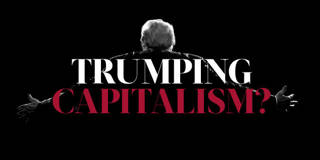OnPoint Subscriber Exclusive
Longer Reads provide in-depth analysis of the ideas and forces shaping politics, economics, international affairs, and more.

Trumping Capitalism?
Donald Trump’s presidency is a symptom of an interregnum between economic orders – a period that will result in a new balance between state and market. While his administration’s economic policies are unlikely to provide the right answer, they may at least show the world what not to do.
LONDON – Donald Trump’s inauguration as the 45th president of the United States is widely seen as the beginning of the end of the post-1945 capitalist order that became globally dominant after the Cold War’s end. But is it possible that Trumpism is actually the end of the beginning? Could Trump’s victory mark the end of a period of post-crisis confusion, when the economic model that failed in 2008 was finally recognized as irretrievably broken, and the start of a new phase of global capitalism, when a new approach to economic management gradually evolves?